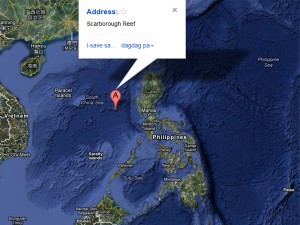Malacañang expects the country’s diplomats to clarify with their Chinese counterparts conflicting statements over the status of Chinese vessels in Scarborough Shoal.
Senator Gregorio Honasan on Tuesday said that the Philippines might have “miscalculated China” in withdrawing two ships from Scarborough Shoal without the benefit of a third-party mediator.
“But let’s avoid repeating these mistakes. Let’s not be too impulsive in withdrawing (the country’s symbolic resistance) to China’s incursions,” he said.
On orders from President Benigno Aquino, a Philippine Coast Guard vessel and a Bureau of Fisheries and Aquatic Resources survey withdrew from the shoal over the weekend.
Asked if the country had been duped into withdrawing from the shoal, Honasan said: “When you deal with a country like China—an emerging economic giant and world power, with a 5,000-year-old history—you prepare; you don’t drop your guard; you apply all your diplomatic and tactical skills.”
Deputy presidential spokesperson Abigail Valte said it was up to the Department of Foreign Affairs (DFA) to find out whether the Chinese would stay in the disputed shoal in spite of bad weather.
“We will defer to the DFA to respond to that particular issue. I did see the statement that was reported this morning. Given the sensitivity of the matter, we will defer to DFA for the appropriate response to that,” Valte said, stressing that the Philippines wanted to deescalate tensions.
The Philippines has always acted within its commitment to pursue the resolution of the issue through diplomatic means, she said. The goal has always been to restore normalcy, she added.
Asked if there was a need to reaffirm the Philippines’ presence in Scarborough Shoal following recent Chinese statements indicating they did not intend to leave the area, Valte said, “The resolution of that question will properly be for the reevaluation of the situation.”
The Philippines pulled out its vessels from the shoal because of an approaching storm. The DFA later announced that China had done the same. But Chinese officials later denied that they had withdrawn from the area.
Asked if the Philippine vessels would return to the shoal, Valte said:
“I don’t want to preempt our actions at the moment… We will be able to advise you as soon as the reevaluation is made or if we have something concrete that we can share with you. As of the moment, we have not been advised by the DFA when the reevaluation is going to take place—what specific time or date.”
As for the pictures of Chinese raising their flag at the shoal, Valte said, “We are yet to verify that.”
Old photo
In an e-mailed statement, Chinese Embassy spokesperson Zhang Hua said the picture published in the Philippine Daily Inquirer front page on Tuesday was taken in the 1980s when a Chinese ocean expedition team was conducting a survey in the area.
Brushing aside suggestions that the photograph was a projection of Chinese power, Zhang said that China had been sending expeditions to the area since 1977, the latest in 2007.
Beijing refers to the shoal as Huangyan Island, while Manila calls it Panatag Shoal and Bajo de Masinloc.
“I hereby want to reiterate that Huangyan Island is China’s inherent territory. The picture on Inquirer itself only serves to prove, once again, China’s effective administration and sovereignty over Huangyan Island over a long period of time in history,” Zhang said.
Global issue
In an interview with the Inquirer, Honasan pointed to the pivotal role played by a third-party body to monitor China’s compliance with the so-called agreement between Manila and Beijing to ease tension in the West Philippine Sea.
“It’s a miscalculation of China’s skill and leverage in the ongoing negotiations which is still manageable in the long term,” he said.
Honasan asserted that the President or his foreign policy advisers might have overlooked the fact that China, an emerging economic and military superpower, would only listen to a third party tasked by both sides to monitor the withdrawal of vessels.
The senator named the United Nations, the United States—which wants to reassert its role as a Pacific power—and the Association of Southeast Asian Nations as third-party brokers.
“This is no longer a local, national, or even a regional issue. This is a global issue since whoever owns the area has control over international shipping lanes and even airspace,” he said, explaining that the dispute impacts on the rights of navigation and passage of foreign vessels as contained in the United Nations Convention on the Law of the Sea (Unclos).
Originally posted: 9:52 pm | Tuesday, June 19th, 2012


